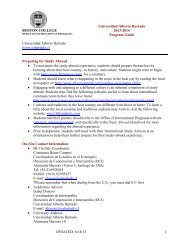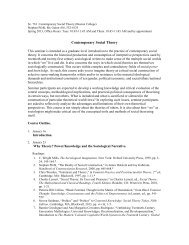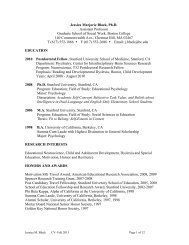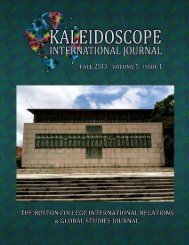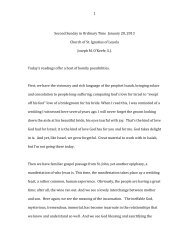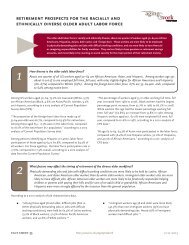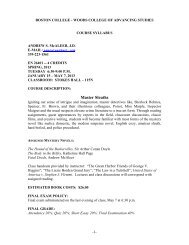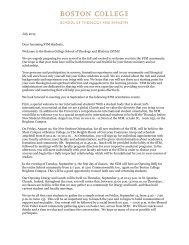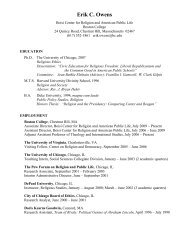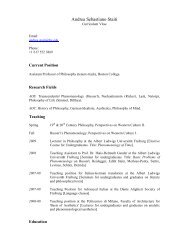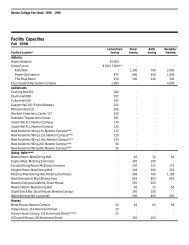separation of powers in thought and practice? - Boston College
separation of powers in thought and practice? - Boston College
separation of powers in thought and practice? - Boston College
You also want an ePaper? Increase the reach of your titles
YUMPU automatically turns print PDFs into web optimized ePapers that Google loves.
2013] Separation <strong>of</strong> Powers <strong>in</strong> Thought <strong>and</strong> Practice? 453<br />
Constitution <strong>of</strong> Engl<strong>and</strong>”). He announced several times that unless the<br />
different <strong>powers</strong> <strong>of</strong> government are separated, tyranny would result,<br />
but he never expla<strong>in</strong>ed why.70<br />
Montesquieu’s theory does not seem primarily to be one <strong>of</strong> checks<br />
<strong>and</strong> balances, though he alludes to this once or twice <strong>in</strong> other parts <strong>of</strong><br />
the book: he says “one must give one power a ballast, so to speak, to put<br />
it <strong>in</strong> a position to resist another”71 <strong>and</strong> “power must check power” to<br />
prevent abuse.72 There is a brief reference <strong>in</strong> Book XI, Chapter 6, to<br />
the importance <strong>of</strong> the executive hav<strong>in</strong>g “the right to check the enterprises<br />
<strong>of</strong> the legislative body,” but it is not elaborated <strong>and</strong> the reason<br />
adduced for it—that otherwise “the latter will be despotic, for it will<br />
wipe out all the other <strong>powers</strong>, because it will be able to give to itself all<br />
the power it can imag<strong>in</strong>e” —seems to presuppose rather than support<br />
the pr<strong>in</strong>ciple <strong>of</strong> the <strong>separation</strong> <strong>of</strong> <strong>powers</strong>.73 That apart, the only reference<br />
to checks <strong>and</strong> balances <strong>in</strong> the chapter, “On the Constitution <strong>of</strong><br />
Engl<strong>and</strong>,” is to the possibility <strong>of</strong> checks with<strong>in</strong> the legislature, with the<br />
aristocratic element check<strong>in</strong>g the popular element <strong>and</strong> vice versa.74<br />
Much <strong>of</strong> what Montesquieu wrote <strong>in</strong> support <strong>of</strong> the <strong>separation</strong> <strong>of</strong><br />
<strong>powers</strong> consisted <strong>of</strong> a simple assertion: “When legislative power is united<br />
with executive power <strong>in</strong> a s<strong>in</strong>gle person or <strong>in</strong> a s<strong>in</strong>gle body <strong>of</strong> the<br />
magistracy, there is no liberty.”75 Why not? “[B]ecause one can fear that<br />
the same monarch or senate that makes tyrannical laws will execute<br />
them tyrannically.”76 Tyrannical execution <strong>of</strong> the laws is no doubt always<br />
a fearsome possibility; but why is it more possible when the laws<br />
have been enacted by the same person as the person apply<strong>in</strong>g them?<br />
The argument is not spelled out. I guess Montesquieu might be endors<strong>in</strong>g<br />
the argument spelled out by John Locke about ways <strong>of</strong> avoid<strong>in</strong>g<br />
oppressive laws, so that “tyrannical execution <strong>of</strong> the laws” refers to their<br />
execution <strong>in</strong> such a way as to exempt the law-makers.77 But one has to<br />
do an awful lot <strong>of</strong> construction to reach that <strong>in</strong>terpretation.78<br />
70 See Montesquieu, supra note 40, at 156–66.<br />
71 Id. at 63.<br />
72 Id. at 155.<br />
73 See id. at 162.<br />
74 Id. at 160.<br />
75 Id. at 157.<br />
76 Montesquieu, supra note 40, at 157.<br />
77 See Locke, supra note 29, at 364.<br />
78 There is some support for it <strong>in</strong> this passage about republics <strong>in</strong> which <strong>powers</strong> have<br />
become united: “Observe the possible situation <strong>of</strong> a citizen <strong>in</strong> these republics. The body <strong>of</strong><br />
the magistracy, as executor <strong>of</strong> the laws, reta<strong>in</strong>s all the power it has given itself as legislator.<br />
It can plunder the state by us<strong>in</strong>g its general wills; <strong>and</strong>, as it also has the power <strong>of</strong> judg<strong>in</strong>g, it<br />
can destroy each citizen by us<strong>in</strong>g its particular wills.” Montesquieu, supra note 40, at 157.



